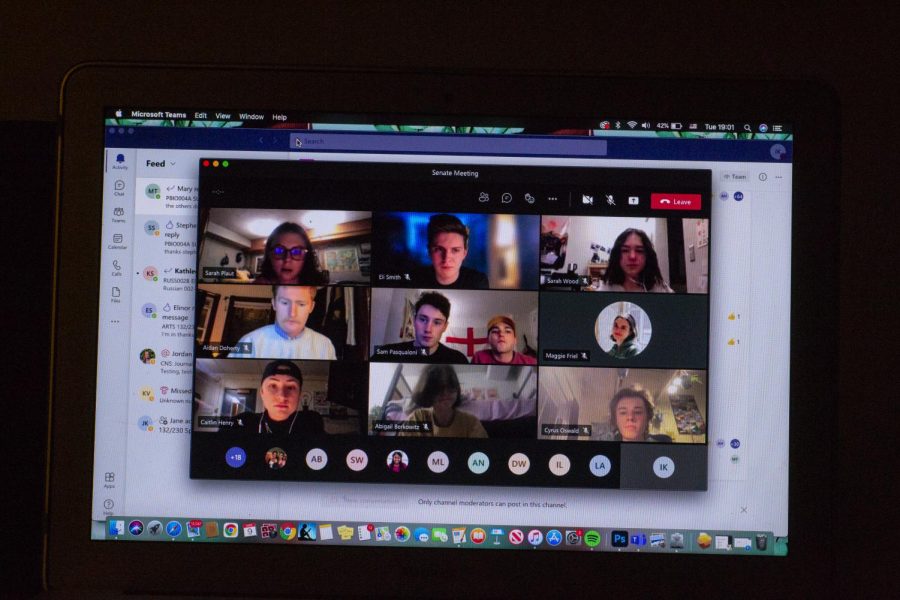SGA lowers barriers for students to run in upcoming elections
SGA met for their March 10 meeting at 7:00 p.m. over Microsoft Teams.
UVM’s Student Government Association lowered the signatures required for students to run for SGA president and VP and removed them altogether for senators after lengthy discussion last week.
Following heated debate at SGA’s March 9 meeting, the measure to lower the signatures for president and VP from 250 to 150 passed 27-5 and the measure to eliminate the signatures altogether for senators passed 27-6.
“I think signatures don’t really have much benefit [for senators],” said Senator Aidan Doherty. “But I think there is value in having the president and the vice president, it shows they are able to connect with students they are not comfortable with.”
Doherty introduced the idea to SGA because he believes COVID-19 is limiting people’s ability to engage with others and get the signatures they need to be able to run.
He said students had issues getting just 30 signatures in the midterm election when they needed 50 to get on the ballot.
Due to COVID-19 regulations, senators said interacting with UVM’s student body and reaching the number of signatures needed has been difficult.
Last year, around this time, UVM officially decided to keep students home after spring break because of COVID-19, causing the annual SGA elections to move away, just like everything else on campus.
Many senators said being sent home created a barrier because they were no longer able to speak face-to-face and therefore weren’t able to get the signatures they needed.
Zyakkiriah Rhoden, chair of the Finance Committee, shared her experience as a woman of color on UVM’s campus, which she said has made conversing with the student body challenging.
“I really do think it is worth getting rid of [the signatures]. As a student of color my circle is but so big,” Rhoden said. “I feel isolated in a lot of those spaces I enter and getting my signatures in the spring remotely was ten times harder.”
Senator Caitlin Henry spoke about her experience running for SGA during COVID-19. She said she believes the group should eliminate the requirement to get petitions because of how hard it is to talk to students with pandemic safety measures in place.
Henry added that getting rid of petitions will ultimately force people to push their platforms so the student body can become more informed about their ideas rather than simply asking someone to sign a piece of paper.
However, some senators who attended the meeting felt the signatures are an essential part of the election and getting rid of them can turn the election into a popularity contest rather than voting for the candidate you like the most.
President Lana Al-Namee believes the signatures are essential because collecting them forces candidates to talk to people and have conversations.
Al-Namee had to finish her campaign virtually right after students were sent home.
“I would FaceTime people and students in certain group chats on Facebook that I did not know [but asked] if I could talk to them about x,y and z,” said Al-Namee. “You find ways when you have too. The whole part of being in SGA is to understand where our student body is at.”
Aidan May, chair of the Legislative and Community Affairs Committee, said getting rid of the petitions signals to the public that SGA does not want to engage with students.
“While our intentions are good in this decision, it is important to think about how the student body will interpret this,” said May. “We made this decision not as a way to make it easier for people to get re-elected but as a way to encourage competition in the voting process and make it more open to everyone.”
Doherty said this decision can be re-evaluated once vaccines are distributed and the community has reached herd immunity, if SGA wanted to bring back signatures.










